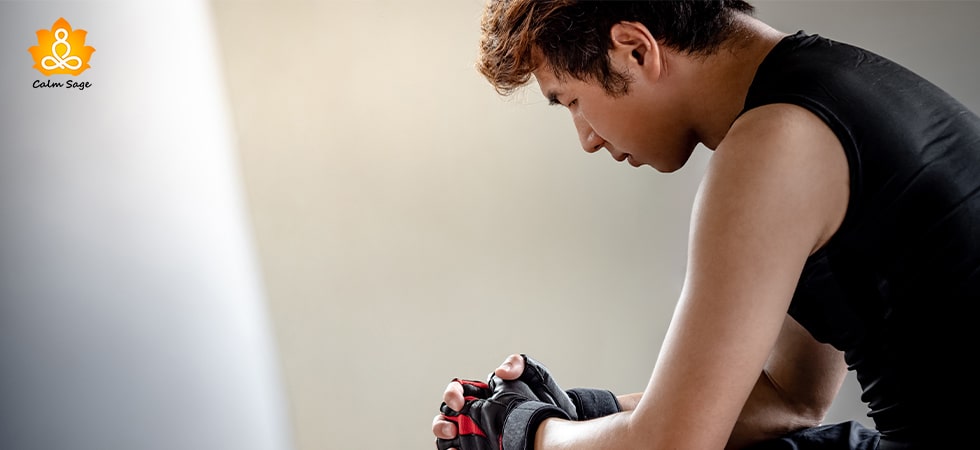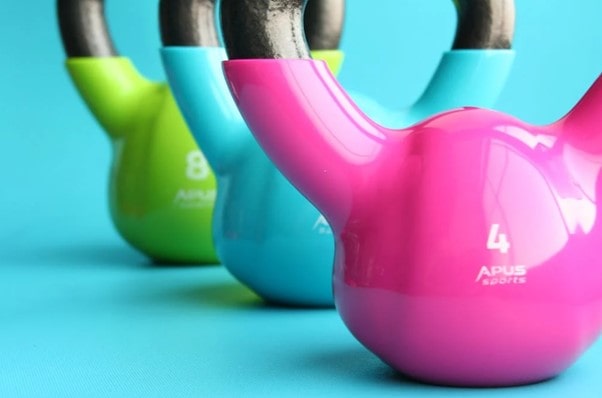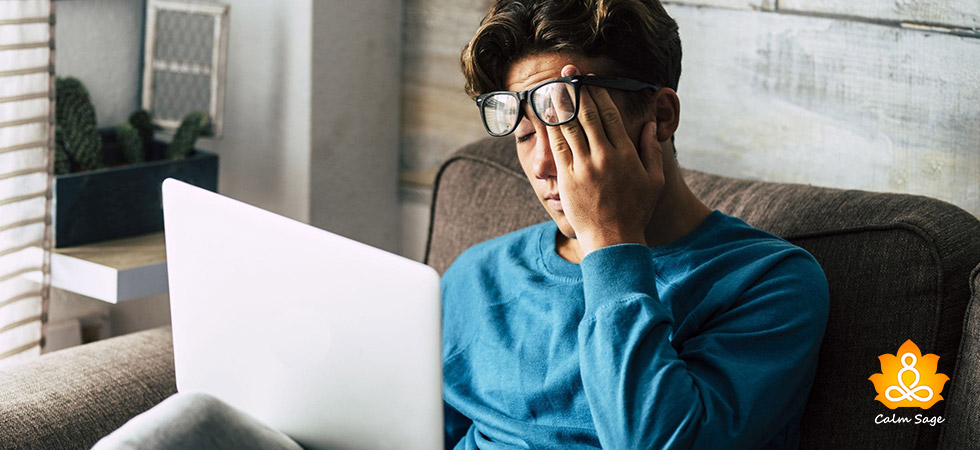Guide 101: How To Get Over Gym Anxiety (Gymtimidation)?

The content in this article is thoroughly researched and written based on the extensive testing and reviewing by a reviews team and does not reflect the viewpoints of the Calm Sage editorial team. Calm Sage could receive a commission from product purchased mentioned or featured in this article.
We all have been in a situation wherein the idea of hitting the gym made us anxious…not that we didn’t want to exercise or try different workout techniques at the gym…but the feelings were quite different.
To be honest I was really afraid of others’ looks or judgement. During the first few weeks, I couldn’t complete my routine because strangers’ stares or judgmental looks made me fearful. Now the idea of changing the gym or changing the instructor makes me fearful again.
Do you know that gym anxiety is a common type of anxiety experienced by almost everyone? In this blog, let us find out what is gym anxiety and how we can overcome gym anxiety. So, let’s get started!
What is Gym Anxiety?
Gym anxiety is a type of anxiety that triggers nervousness about working out in a gym. People living with social anxiety disorder are prone to gym anxiety. Gym anxiety can also be referred to as “gymtimidation.” Gymtimidation or gym anxiety is often rooted in the fear of the unknown, fear of being stared at, or fear of how to or what to do at the gym.
If you’ve been going to the gym for months and still the idea of hitting the gym makes you nervous, weird, or fearful, you might be struggling with gym anxiety disorder. People struggling with gym anxiety often avoid attending the gym, the anxiety is so severe that it starts interrupting the overall quality of life. Keep reading this blog to learn how to stop gym anxiety.
What drives Gym Anxiety?

Gym anxiety can hit anyone. Mostly, it is likely to affect teenagers or children struggling with social anxiety. Below are some of the common reasons behind gym anxiety:
- Being bullied by other members
- Being stared at by strangers
- Excessive worrying about using heavy equipment
- Getting picked last during group sessions or classes
- Lack of self-esteem
- Self-consciousness related to weight or body shape
Symptoms of Gym Anxiety
Symptoms of gym anxiety can be different for different personalities. Below are some of the common symptoms of gym anxiety stemming from social anxiety disorder:
- Avoidant behaviors
- Increased rapid rate
- Excessive worriedness
- Fear of the unknown or being stared at
- Muscle tension
- Nervousness or shakiness
- Shortness of breath
- Tightness in the chest
Are Social Anxiety Disorder and Gym Anxiety Connected With Each Other?
Research shows that people recently diagnosed with social anxiety disorder are prone to developing gym anxiety. At the same time, I could find research that states exercise can be a great alternative option for overcoming social anxiety disorder. In such situations, try hitting the gym regularly and read other options for overcoming gym anxiety.
What Triggers Gym Anxiety?
There could be various reasons behind the triggers of gym anxiety, common triggers can include:
- Changing clothes in front of people
- Feeling intimidated by the shape of your body
- Fear of being stared at
- Fear of using heavy equipment
- Difficulty attending gym classes in group
How to Overcome Gym Anxiety?
If you think you or your loved one is struggling with gym anxiety and the symptoms have now started interrupting the overall quality of life, follow the below-mentioned strategies to overcome gym anxiety along with social anxiety:
1. Process your thoughts
Have you ever observed your thoughts, what drives your anxiety, why you become so anxious when it comes to hitting the gym, or when you often feel anxious? If your anxiety runs throughout the day, you need to work on your emotions.
Learn to manage your negative thoughts so that you can fight anxiety and replace your negative thoughts with positive, helpful, and realistic thoughts. Whenever your anxiety kicks in, try converting your thoughts to more positive thoughts. For example:
- Instead of focusing on others’ stares or judgment, allow yourself to focus on your routine and achieve your health-related goals.
- Instead of observing others’ goal levels, set small and achievable goals for yourself and remind yourself every day, “You can do it.”
2. Focus on building self-confidence
Have you ever observed your confidence level in fields wherein you excel? You might be good at studies, work, career, relationships… if a gym is not working for you. Don’t worry, allow yourself first to get comfortable in the environment, make your moves slowly, and prove yourself in this area too. Herein you can try:
- Try becoming more regular in the gym so that you can allow yourself to get comfortable in the environment.
- If you’re afraid of using an equipment, research about it, so that you can become more familiar with the equipment, and resolve your purposes.
- Every time you hit the gym, put on your favorite music or motivational music to boost your confidence.
- Wear comfy clothes to the gym so that you can focus more on exercising.
3. Try exposure techniques
Have you ever heard of exposure therapy? During exposure therapy sessions, the therapist works on gradually exposing ourselves to the source of fear. Try the same techniques and gradually expose yourself to new challenging situations. Herein you can try:
- Be an early bird, hit the gym early, avoid crowds, and achieve your goals.
- Listen to music or audiobooks to manage your anxiety
- Set small and achievable goals for yourself so that you can slowly move towards achievement.
- Try to make small talk with the instructor or members who you see regularly.
4. Use social comparison as motivation
It’s a fact that everyone in the gym has started from a level zero. With time and hard work, they have gained so much confidence in their life. If they can do it, you can do it too! Start seeking motivation from other team members and set personal goals for yourself.
5. For challenging thoughts and emotions, seek professional help
If you still are not able to manage your anxiety or the anxiety has started interrupting your quality of life, such symptoms can also be a sign of other mental health issues such as social anxiety disorder, body dysmorphic disorder, eating disorder, and others. In such situations, connect with a mental health professional to get the right diagnosis and treatment.
To connect with a mental health professional through online platforms, click below:

Great for a large network of licensed therapists
-
$60 to $90/week, billed every 4 weeks
-
Therapy via messaging, phone, or live video chat
-
Flexible cancellation at any time
20% off your first month

Great for CBT Based therapists
-
$40/week, billed every 4 weeks
-
Therapy via messaging, phone, or live video chat
-
Specialization for CBT based Therapy
20% off your first month

Best for Treatment Plants
-
$60 to $90/week, billed every 4 weeks
-
Therapy via messaging, phone, or live video chat
-
Flexible cancellation at any time
$100 off your first month with code SPACE
Frequently Asked Questions: Which types of therapy are used for treating anxiety?
Below listed are some effective therapy options for treating anxiety:
- Acceptance and commitment therapy (ACT)
- Cognitive behavioral therapy (CBT)
- Exposure therapy
Key Takeaway: Trying Out the Alternatives
If you’re not feeling comfortable in the gym, you can try other alternatives:
- Join the gym with your friends, family members, or loved ones.
- Get yourself a professional and personal trainer for proper learning and orientation.
- Try a home workout and order some important equipment at home.
- Join Zumba, yoga, or meditation classes to overcome anxiety.
- Try online workout classes to manage your social anxiety.
- Try other exercise options such as swimming, cycling, running, and others.
I hope this blog helps you understand how to stop gym anxiety. Comment down and share your views on the same or you can also write to us at Calm Sage.
For more such content, connect with us through all social media platforms.
Thanks for reading!




















